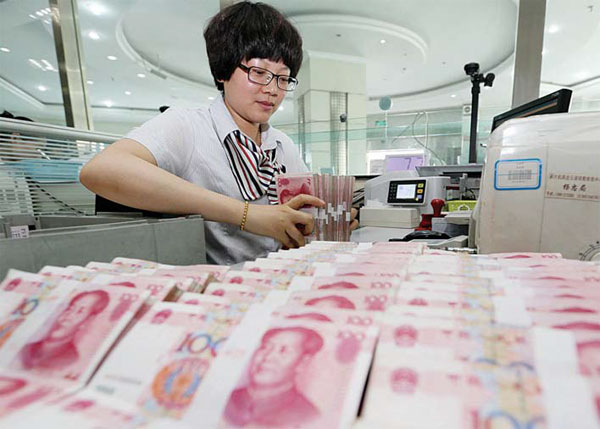Depreciation's effect limited
Updated: 2015-08-14 08:54
By Cecily Liu, Zhang Chunyan and Wang Mingjie in London, Paul Welitzkin in New York, Hu Yuanyuan and Chen Jia in Beijing(China Daily Europe)
|
|||||||||||
 |
|
A bank clerk counts RMB banknotes in Lianyungang, Jiangsu province. Si Wei / For China Daily |
Blow to european exports expected to be short term, experts say
European business leaders and experts say that while the renminbi's depreciation puts pressure on European exports in the short term, it won't affect them in the long term.
The Chinese currency continued to fall on Aug 13 after the central bank reformed the exchange rate formation system to better reflect the market.
The central parity rate of the renminbi, or yuan, weakened by 704 basis points, or 1.1 percent, to 6.401 against the US dollar, narrowing from 1.9 percent on Aug 11 and 1.6 percent the next day, according to the China Foreign Exchange Trading System.
It fell for three days in a row after the People's Bank of China cut the yuan's reference rate against the US dollar to 6.2298 on Aug 11, a move to make it more reflective of market forces.
The central bank stressed that the Aug 11 depreciation was a "one-off" move to fix the discrepancy between the reference rate and the market's spot rate. The spot rate has been consistently higher by about 1.5 percent since June. The currency can fluctuate by as much as 2 percent a day.
The International Monetary Fund described the Chinese central bank's move as "a welcome step" that allows market forces to have a greater role in determining the exchange rate.
Although the yuan stemmed its worst loss in almost two decades, "there is no basis for the depreciation to persist, and the central bank will step in when the market is distorted", People's Bank of China Assistant Governor Zhang Xiaohui said at a news briefing in Beijing on Aug 13.
Yi Gang, vice-president of the central bank, says the adjustment spurred by the Aug 11 change in how the PBOC determines the yuan's daily reference rate is "basically already completed", adding that China will respect the market while letting the government play its role.
Rain Newton-Smith, the Confederation of British Industry's director for economics, tells China Daily: "This move to allow the renminbi to drop a little could help support Chinese growth against the backdrop of an unexpectedly sharp fall in the country's exports in July." The CBI is the United Kingdom's top business lobbying organization.
"Although a depreciation in the renminbi against the sterling will put pressure on UK exports to China in the short term, the effect on Chinese growth should be beneficial to UK exporters over the longer term," she says.
This opinion is echoed by Mike Hawes, chief executive of the Society of Motor Manufacturers and Traders. "While the devaluation of the Chinese currency could put pressure on exports in the short term, the UK automotive industry is in a unique position to tackle any challenges with its diverse, competitive range of products, which are exported to more than 100 countries worldwide," he says.
Today's Top News
Rain in Tianjin poses no health risk, says official
Two HK women among four Chinese killed in Bangkok blast
South Korea's Park has good reason to attend Sept 3 parade
Yuan move is likely to deliver positive results in long term
Sodium cyanide in Tianjin to be cleared
Premier Li pledges thorough investigation into deadly blasts
Bomb in Thai capital kills 19, including 3 Chinese nationals
Port operations return to normal after Tianjin blasts
Hot Topics
Lunar probe , China growth forecasts, Emission rules get tougher, China seen through 'colored lens', International board,
Editor's Picks

|

|

|

|

|

|






